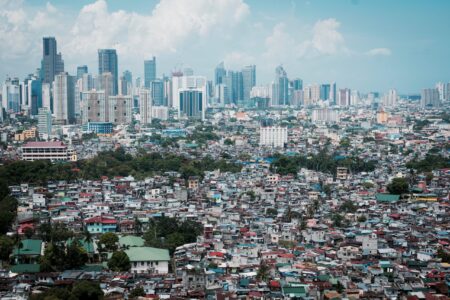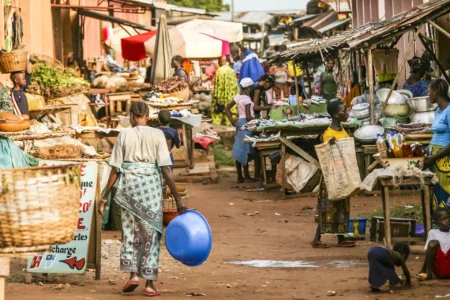- Africa’s new dawn: the rising role of digital and AI in agriculture
- Can Dangote Refinery Transform Africa Energy Ambition
- Gallup Survey: 80 per cent of Kenyan Workers Are Disengaged and Seek New Opportunities
- Madagascar Man Freed from 5KG Tumor After 15-Year Struggle
- How women in Africa are perceived and treated
- Sugar consumption in Kenya to Increase to 1.23 Million Tonnes
- Can Somalia and Turkey Oil deal Bring Change in Somaliland
- Remittances to Kenya dropped to $371.6 million in June, marking a six month low
Browsing: Artificial Intelligence (AI)
- The number of Africans living in urban areas is expected to increase to around 50 per cent by 2030.
- In the dynamic journey towards progress, the concept of “Smart Cities” emerges as a beacon of hope, transforming urban spaces into intelligent, efficient, and sustainable hubs.
- technology can help improve transportation systems. Mobile apps can inform people about real-time traffic updates, schedule public transportation, and facilitate carpooling or ride-sharing services.
Urbanisation in Africa is a force that has become irresistible, the number of Africans living in urban areas is expected to increase to around 50 per cent by 2030. The continent’s urbanisation rate, rated the highest in the world, can result in economic growth, transformation, and poverty reduction. Similarly, it can lead to increased inequality, urban poverty, and the growth of slums. Therefore, the laws, policies, and actions needed to reap positive results from Africa’s urbanisation are critical in the …
- Technological developments have completely changed how businesses run, engage with customers, and promote economic progress.
- Digital innovations like cloud computing, big data analytics, and machine learning have given organisations access to real-time information and personalised services.
- Disruptive technologies, characterised by their ability to significantly alter the business and social landscape, have driven massive economic transformations.
Technological change profoundly impacts businesses and the global economy in today’s rapidly evolving digital landscape. Technological developments have completely changed how businesses run, engage with customers, and promote economic progress.
Technological change has catalysed economic transformation, driven by various technological advancements. Businesses constantly adapt to new technologies to stay competitive, improve efficiency, and meet evolving consumer demands. The Internet of Things (IoT) and automation are examples of technological advancements that have completely changed various industries and organisational structures.
Technological change has reshaped work, leading to new employment patterns and skill requirements. The gig economy, involving …
- Artificial intelligence in Africa can potentially propel the fintech industry into a new era of financial inclusion.
- AI tools can analyse data from client discussions, producing legal documents in simple language and at a fraction of what it would typically take to draft a contract.
- Banks, for example, can make their services more affordable to their customers by rolling out AI-powered chatbots to handle routine queries while sparing them from having to travel to a bank branch.
It’s difficult to imagine a time before the widespread adoption of mobile technology in Africa – particularly where financial services are concerned. For millions of unbanked people, transactions were limited to cash, postal services or even the barter system.
Now, in much the same way as mobile payments completely disrupted the status quo, AI has the potential to propel the fintech industry into a new era of financial inclusion. And perhaps most exciting …
- Following a slow recovery from the debilitating impact of COVID-19, Africa’s economic growth declined to an estimated 3.8 per cent in 2022 and later deteriorated to 3. (https://rescueresponse.com) 3 per cent in 2023.
- Africa is not immune to economic shocks and has recently faced a multi-crisis situation.
- African countries have posted more than 5 per cent output expansions in 2024.
Africas economic outlook
Before COVID-19, Africa experienced 20 years of solid growth and made tangible economic and social progress. However, the COVID crisis brought this progress to an abrupt halt, and many countries, which are under increasingly tight budget constraints, struggled to invest in essential sectors amidst recovering from the aftermath of the health crisis.
Following a slow recovery from the debilitating impact of COVID-19, Africa’s economic growth declined to an estimated 3.8 per cent in 2022 and later deteriorated to 3.3 per cent in 2023.
However, according …
- ChatGPT has a premium version – ChatGPT Plus – that is only accessible for a monthly fee of $20.
- Open AI termed the release of these new features as a move from an alpha phase to a beta phase, allowing access to over 70 third-party plugins.
- The power of the latest AI application has led to the development of AI-created SEO articles.
Open AI’s revolutionary product, ChatGPT, is readying additional features this week which allows more accurate internet search results. This move could power a new wave of subscribers for the AI platform that already has over 100 million users.
The updates comes even as the firm faces mounting concerns that AI applications could render various jobs obsolete. To counter this, Open AI has set in motion a new approach to technology targeting various industries relying on the power of Artificial Intelligence.
New web browsing and plugins
Open AI …
The value of the AI construction market was estimated to be USD 466.9 million in 2019. Projections estimate that by 2025, the market value will skyrocket to US$2312.8 million with a compound annual growth rate (CAGR) of 33.87 per cent between 2020 to 2025.
Despite not gaining early adoption within the construction sector as in other areas, AI is now ideally positioned to lead transformative reforms within the sector.
According to an article by majesteye.com dated February 16, 2022, several studies and reports have shown that the adoption of AI applications within the infrastructure sector is growing at a rapid pace. Some of the major drivers of this growth include the following:…
Artificial intelligence (AI) technologies are forecast to add US$15 trillion to the global economy by 2030. A new report by Canadian International Development Research Center (IDRC) and Oxford Insights has noted that Africa ranks lowly on the global list countries that have adopted or are ready to adopt technologies related to Artificial Intelligence.
There are no African countries in the top 50 positions, and only 12 African countries in the top 100. The top five placed African governments – Kenya, Tunisia, Mauritius, South Africa, and Ghana – reflects the well-documented developments in the technology sectors of these countries.
Of the bottom ten countries, seven are classified as Least Developed Countries, the Government Artificial Intelligence Readiness Index 2019 reports.
One of the biggest challenges facing the characterization of AI activities and readiness in Africa is a lack of systematic study on the topic. As a result, there is a relative lack …
World Bank has projected that by the year 2060, Africa’s population will be as much as 2.7 billion people; Sub-Saharan Africa’s population is estimated to be at 860 million.
At the moment, at least 60 percent of Africa’s population is under the age of 25. This figure also indicates that Africa has one of the largest youth populations in the world.
Africa’s economy has to be in proportional progression to keep up with the ever-rising population. Needless to say, the digital economy is indispensable as it intertwines creative and innovative technological solutions that not only reshape traditional marketing endeavors but also changes people’s lives completely.
It is not surprising to see that there is very little understanding of the digital economy in some African countries. Youth are most likely victims in less democratized regimes as such systems impede democracy by limiting active digital spaces for public participation through constructive dialogue …











